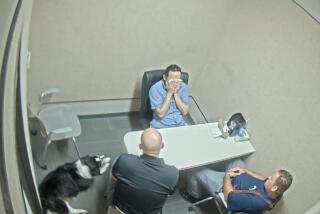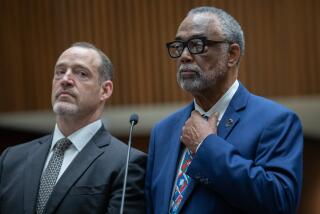Son’s Lawsuit Against Sol Price Is Thrown Out
- Share via
Superior Court Judge Arthur W. Jones on Wednesday threw out the $100-million emotional-distress lawsuit filed against multimillionaire Sol Price by his estranged son, Laurence, who claimed that his father was cruel, cold and domineering.
After seven days of trial and bitter, searingly personal testimony, Jones said that Sol Price, 73, had been “reasonable” in the raising of Laurence, 43, who, evidence showed, was a difficult child and still has serious emotional problems.
Laurence had claimed that he was deeply hurt when his father refused to attend a bar mitzvah party--a key issue in the case--but Jones ruled that Sol Price had a First Amendment right not to go.
No ‘Outrageous’ Acts
The dismissal came after Laurence’s lawyer, Marvin Mitchelson, rested his case. Jones ruled that Mitchelson had shown no evidence that Sol Price had committed any “outrageous” acts and, therefore, there were no issues for the jury to consider.
Later, Gerald McMahon, Sol Price’s lawyer, announced that Price had decided to drop his counterclaim for $2.2 million in loans for which his son had failed to repay him.
At issue in the ruling was an incident that occurred Jan. 24, 1987, when Sol Price arrived a few minutes late for the bar mitzvah of his grandson Benjamin, Laurence’s child. Sol Price stayed in the back of the hall during the ceremony and did not attend the party afterward.
The incident, a relatively minor event in the stormy history of one of California’s wealthiest families, emerged this week as the crux of a novel lawsuit brought by Laurence Price. He claimed that the behavior of his father, founder of the Price Club discount warehouses, caused him such severe emotional distress that he should be awarded $100 million in damages.
‘Nothing Else to Say’
“It was a personal matter. It never should have been in court,” Sol Price said Wednesday, his eyes brimming with tears. “There’s nothing else to say.”
A few yards away, his son chatted with reporters and declared himself the winner because now “it was out and people knew it, and my family knew it, and they heard it from other people--the truth about what happened with the kids, about what my father has done. That’s a victory.” He said he thinks it unlikely that the family rift can be healed anytime soon.
The question of whether such family disputes should be decided by the courts was at the center of Jones’ ruling Wednesday. A difference of opinion over “social graces really should not be the subject of a legal action,” Jones said.
Mitchelson, who set a precedent with the first successful “palimony” case a decade ago, said the Price litigation was a “cutting-edge case” because few emotional-distress cases are brought against family members. “We feel there are certain rights of children to sue their parents under these circumstances,” he said. Mitchelson said no decision has been made on whether to file an appeal.
Suit Filed in 1987
Laurence Price filed the lawsuit, alleging intentional and negligent infliction of emotional distress, on Dec. 1, 1987, after losing a legal battle to retain leases for lucrative tire-installation centers attached to the Price Club discount warehouses his father started in 1976. Sol Price had arranged for Laurence to own and operate the centers in 1978 after Laurence, a high school dropout, had been out of work for two years.
Sol Price and other officials of the Price Club testified that they decided to cancel Laurence’s leases for the business, worth about $3.7 million, because he was mismanaging it and was extremely difficult to deal with, even on the most routine business matters.
But, in testimony, Laurence Price claimed that his father ordered the leases canceled because he would not accede to his father’s demand that he return his two sons to their mother, who had won custody in a divorce proceeding. During the seven days of trial this month, Laurence alleged that his father had always been cold and cruel.
A psychologist testified that Laurence was so disturbed by his father’s behavior that he could commit suicide.
Laurence also complained of other incidents over the years that he believed were attempts by his father to inflict pain on him and alienate him from his sons. Once, he said, his father took his son Jonas on a trip to see the campus of Stanford University without notifying Laurence, and the father helped Jonas buy a car without consulting him, Laurence said.
Statute of Limitations
However, the only action that occurred within the year before the filing of the suit was the bar mitzvah incident, making it the only incident covered by California’s statute of limitations on emotional-distress claims.
In his ruling Wednesday, Jones said that, far from being cruel, Sol Price had taken a “reasonable” approach to the raising of his emotionally troubled son. Sol Price had tried “the soft line, the hard line and the middle line,” Jones said. “You get into the considerations, ‘Am I indulgent enough or too indulgent?’ There are no answers to these questions.”
After the decision Wednesday, McMahon told reporters that Sol Price and his wife, Helen, “didn’t want to be here in the first place. We tried in many ways and on many occasions to resolve this matter. He (Sol) could have foreseen the outcome and wanted to protect Larry from it.”
Evidence at the trial showed that Sol Price had helped Laurence financially with loans and gifts for most of his lifetime. Nevertheless, the two rarely got along.
Sol Price testified that he believes he “spoiled” Laurence and that he bears the blame for his son’s behavior.
“I think Larry feels that the world owes him a living,” Sol Price testified. “He certainly is a person who wants a lot of benefits and no burdens. I think he’s spoiled.”
Several Jurors Sympathetic
Several of the jurors expressed sympathy for Laurence Price in interviews Wednesday, but said they were unsure how they would have voted.
“I felt sorry for Laurence, but not that sorry,” said Julia L. James, an instructional aide at El Cajon High School. “I think he could have been more conciliatory. I felt that, if Laurence had wanted to, and felt a little empathy for his dad, they could probably have gotten together.”
Of Sol Price, she said: “He was the tough old patriarch of the family. He had the money, he had the business, but, golly, he has feelings too.”
Ruth Romo-Dutra, another juror, said she did not know what her decision might have been because the jury had not yet been instructed in the applicable law. However, she said: “I feel really sorry for Larry. I think he’s a wonderful person. . . . I think he was deprived of the thing he needed most--love and affection.”
Juror Lynda L. Breunig said she took an informal poll after the case was thrown out Wednesday and found that “there was an awful lot of emotion for Larry.”
However, she said: “The main thread that was running through the opinions I got was that there wasn’t enough there to make an award of that amount.”
More to Read
Sign up for Essential California
The most important California stories and recommendations in your inbox every morning.
You may occasionally receive promotional content from the Los Angeles Times.













